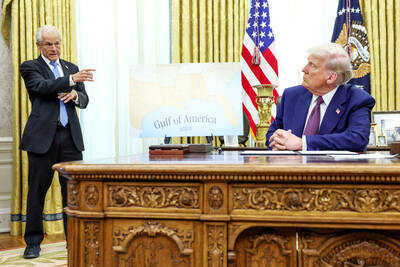Russian President Dmitry Medvedev said he sees no ideological grounds for a war with the US — cold or hot — despite strained relations with Washington and the NATO alliance.
Russia’s relations with the US were already at a post-Cold War low when they were further damaged by Russia’s war with US ally Georgia in August. Russia has complained vehemently about what it says is a growing US military presence near its borders.
But Medvedev said on Wednesday that the Cold War was based on ideological differences between the Soviet Union and the NATO countries.
“We do not have such ideological differences around which a new cold or any other kind of war could start,” Medvedev said after talks with Spanish Prime Minister Jose Luis Rodriguez Zapatero outside St Petersburg.
Medvedev said he would not “dramatize” troubled ties between Russia and NATO and said NATO needs Russia more than Russia needs NATO.
He also said the outcome of the US presidential election should not affect relations between Washington and Moscow.
Regardless of who wins the US presidency, “Job No. 1 is to deal with the situation in the economy — that’s what must be done,” he said.
Russian Prime Minister Vladimir Putin also continued Russia’s repeated verbal jabs at the US over the global financial crisis.
“Everything that is happening today in the sphere of economics and finance began, as is known, in the US,” Putin told a Cabinet meeting, according to an official transcript of the meeting.
“This whole crisis, which has hit many countries and, most sadly, the inability to make adequate decisions — this is [the result] not of the irresponsibility of specific individuals but the irresponsibility of a system — a system that pretended to leadership,” he said, clearly referring to the US.
“But we see that it is not only unable to provide leadership but not even capable of making adequate, absolutely necessary decisions to overcome crisis phenomena,” he said.
White House spokesman Tony Fratto, asked to respond to Putin’s remarks, said: “We have dealt with this problem, a very complicated and far-reaching problem, in as aggressive a way possible. And I don’t think there’s any question of that, and I’ll just leave it at that.”
The top US diplomat for Latin America, Assistant Secretary of State Thomas Shannon, said on Wednesday that, despite Russia’s diplomatic and military overtures in the region, the US has “no intention of reviving Cold War images or Cold War rhetoric.”
“This is a conflict that the region has thankfully left behind,” he said in a telephone interview.
Asked how concerned Washington is about Russia’s deepening ties with Venezuela and its dispatching of a naval squadron there on a visit, he said: “There is no doubt about who holds the preponderance of military power in the Caribbean, so we certainly don’t see this activity as presenting a military or geopolitical threat to us.”

‘EYE FOR AN EYE’: Two of the men were shot by a male relative of the victims, whose families turned down the opportunity to offer them amnesty, the Supreme Court said Four men were yesterday publicly executed in Afghanistan, the Supreme Court said, the highest number of executions to be carried out in one day since the Taliban’s return to power. The executions in three separate provinces brought to 10 the number of men publicly put to death since 2021, according to an Agence France-Presse tally. Public executions were common during the Taliban’s first rule from 1996 to 2001, with most of them carried out publicly in sports stadiums. Two men were shot around six or seven times by a male relative of the victims in front of spectators in Qala-i-Naw, the center

Canadian Prime Minister Mark Carney is leaning into his banking background as his country fights a trade war with the US, but his financial ties have also made him a target for conspiracy theories. Incorporating tropes familiar to followers of the far-right QAnon movement, conspiratorial social media posts about the Liberal leader have surged ahead of the country’s April 28 election. Posts range from false claims he recited a “satanic chant” at a campaign event to artificial intelligence (AI)-generated images of him in a pool with convicted sex offender Jeffrey Epstein. “He’s the ideal person to be targeted here, for sure, due to

DISPUTE: Beijing seeks global support against Trump’s tariffs, but many governments remain hesitant to align, including India, ASEAN countries and Australia China is reaching out to other nations as the US layers on more tariffs, in what appears to be an attempt by Beijing to form a united front to compel Washington to retreat. Days into the effort, it is meeting only partial success from countries unwilling to ally with the main target of US President Donald Trump’s trade war. Facing the cratering of global markets, Trump on Wednesday backed off his tariffs on most nations for 90 days, saying countries were lining up to negotiate more favorable conditions. China has refused to seek talks, saying the US was insincere and that it

As Elon Musk called one of US President Donald Trump’s top economic aides a “moron,” the White House on Tuesday declared that “boys will be boys.” Musk and long-time Trump trade adviser Peter Navarro have been squabbling publicly over Trump’s decision to impose sweeping tariffs on most of its trading partners. The move has triggered a market sell-off and prompted analysts to wonder if the US is headed into a recession. “Look, these are obviously two individuals who have very different views on trade and on tariffs,” White House press secretary Karoline Leavitt said. “Boys will be boys, and we